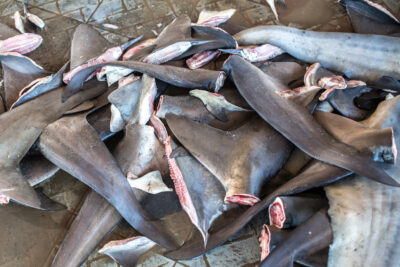
Stop the Shark Finning Operations
Audrey Evangeline Lee is a writer living in Singapore.
When you hear the word “sharks”, you probably think of a fearsome hunter as images of the great white from the movie Jaws fill your mind. In fact, the vast majority of sharks are harmless to humans, and they play an important role in the ocean ecosystem.
However, sharks have been declining rapidly as the demand for shark fins increase, and their title as the ocean’s top predator has been replaced by humans.
Every year, millions of sharks die a slow, agonizing death because of shark finning. Shark finning is the inhumane act of removing fins from sharks caught in a fishery. Once their fins are cut off, they are kept while the body is thrown back into the ocean, often while they are still alive. Unable to swim without their fins or pass water across their gills, the sharks are left to die, either bleeding to death, eaten by other predators or from suffocation as they sink to the bottom of the ocean.

Many fishermen are only interested in the fins, which is only one to five percent of the shark’s weight, as shark fins are now among the most expensive seafood items in the world, sometimes selling for as much as a thousand US dollars for one kilogram. They are also tempting targets for fishermen as they have high monetary and cultural value. Therefore, it is more economically beneficial to use the limited space on a vessel to store the high-priced shark fins than to fill it with the low-priced meat of the shark’s body. Many shark bodies also contain urea, which turns into ammonia once the shark has died and can contaminate other fish.
Shark fins are being harvested in large numbers to satisfy the growing demand for shark fin soup, which is an Asian “delicacy”. Shark fin soup has been a long-standing tradition at Chinese festive celebrations and wedding banquets and is also a symbol of status in the Chinese culture. In the past, Chinese emperors favoured the soup as it was thought to have medical benefits and represented a victory against sharks. Once the shark fins are harvested and dried, they will be sold in markets to either rich individuals or restaurants to be made into shark fin soup. These days, a bowl of shark fin soup can easily cost up to a hundred dollars and are often served at wedding celebrations so that the host can impress their guests with signs of their wealth and prosperity.
Ironically, the shark fin itself does not add any flavor to the soup; it just provides a gelatinous texture for the soup. Chicken, or other stock, is used to add flavour.
Not only is the practice of shark finning animal cruelty, but it is also having a catastrophic effect on the shark populations around the world. At least 8,000 tonnes of shark fins have been shipped around the world to restaurants. Many fishermen have reported that sharks are getting smaller, because they have not been given enough time to mature. Sharks can take more than seven years to reach maturity, and they often only raise one or two pups each year. With their slow growth and low reproductive rates, many shark species are likely to go extinct if action is not taken immediately. More than thirty species of sharks are listed as threatened, according to the International Union for the Conservation of Nature (IUCN), including the scalloped hammerhead, which is endangered, and the smooth hammerhead, which is vulnerable. Today, the population of many shark species has decreased by more than 70% to 90% due to human shark fisheries.
The consequences of the decline in shark populations on the ocean life are immense. Sharks are considered the apex predators of the ocean, and they are believed to stabilize the ecosystem, just like the pillars of a building. Once they are gone, there will be negative effects on both other ocean creatures and humans alike. Populations of smaller sharks and rays may well increase, consuming more fishes, and, in turn, fishermen will catch less fish which will affect their business.
There are several ways that campaign groups, government bodies and organizations alike are trying to address this cruel practice – by placing bans on finning, trade restrictions, and shark sanctuaries.
The International Marine Mammal Project of Earth Island Institute, which has agreements with more than 90% of the world’s tuna fishing companies, asks our participating companies to ban shark finning on board tuna vessels and to release alive any sharks that are caught by accident in purse seine nets or longlines. Several Regional Fisheries Management Agencies, treaty organizations that regulate tuna fishing worldwide, have adopted similar policies and regulations. For more information on Dolphin Safe tuna and a list of companies that have pledged to be Dolphin Safe, go to our web page.
Shark finning is banned by several countries and some international agreements; however, illegal activities still occur and the capacity for enforcement by many countries is lacking. Finning has been reported in areas such as Australia, Costa Rica, the Marshall Islands, and Cocos Islands.
There is still a long way to go before the shark fin soup will be relegated to history. A survey conducted found that shark fin soup is still served at 98% of Hong Kong restaurants. Finning bans alone are not enough to reduce the number of sharks being killed and a variety of different approaches to this practice may be the key to making more progress towards protecting the sharks.
But the real power to end the disgusting and gruesome fin trade is firmly rooted in the consumer and the laws of the consuming nations.
Images courtesy of Shutterstock.
